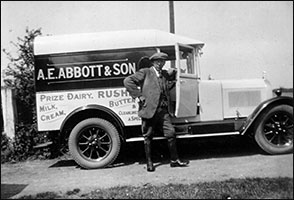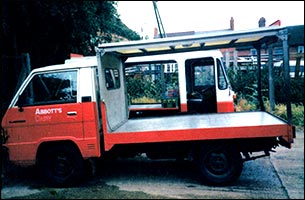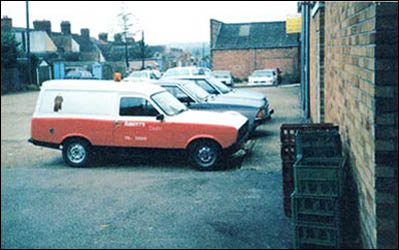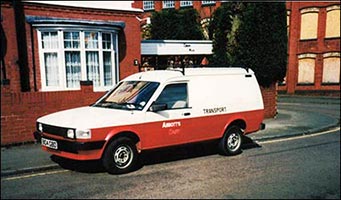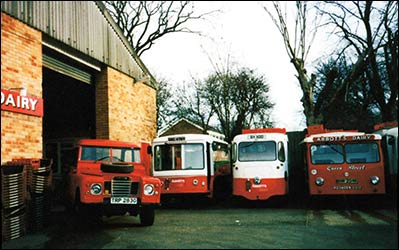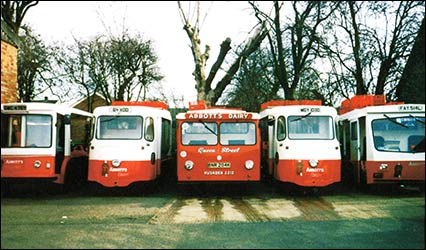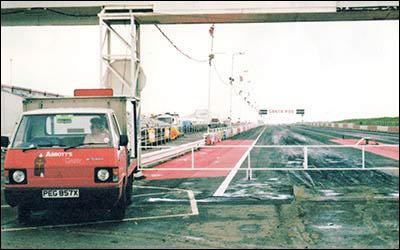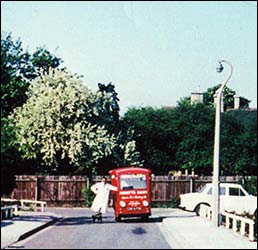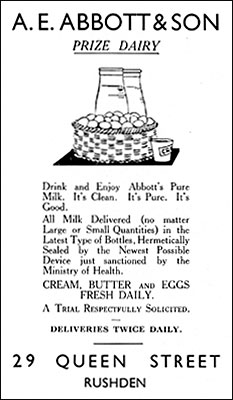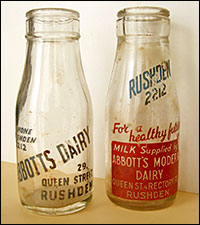|
|||||||||
| From an interview with Geoff Abbott by Rae Drage on 8th October, 2008. Transcribed by Jacky Lawrence. |
|||||||||
|
Abbott's Dairy
|
|||||||||
The dairy was founded in 1897. My grandfather used to buy milk from his brother in Wymington and he had a bucket and a measure and that’s how the firm began. If he ran out of milk half way round he would just go to the village pump and top up his bucket, it was not the type of thing that you would get away with now, but then they did. Gradually, the business grew from one bucket and then it came to a hand cart, and then to a horse and cart, to the first motor which my father bought from York Ward Rowlett in Wellingborough. He brought a brand new van, sign written, coach painted. It looked absolutely the bee’s knees and it cost £89. That was the first of the vans and gradually it got to two vans and there it remained until things began to pick up after the war. When the new building boom started and Rushden estates started going up [1950] then the business started to expand. About that time I took over from my father. Even so, when I took over, I went from two vans and two part-timers to five vans and five full time persons and the dairy that still stands at the top of Albert Road is now owned by a Double Glazing Company. On one occasion during the war my father was delivering in Griffith Street and the Army pulled up the cart and said. 'We’re confiscating your horse for the war effort.' They took the horse out of the shafts and he had to pull the cart back on the road without the horse. The horses in those days were grazed in what was known as the Moors which is now the secondary school for girls in the Hayway. For the people in Spencer Road, in the houses which overlooked Spencer Park, it was one of the mornings' amusements to see my Grandfather trying to catch his horses. They were leaning over the fence, laughing and calling names to him, as he tried to catch them. I was a boy, raised during the war, up to the time that I joined the Navy. When I came home from the Navy, from the Far East, 1947, was the time of the big blizzard. The snows were horrendous, it snowed and snowed for weeks and roads were cut off. The Rev. Green at the Rectory wrote to my commanding officer and asked for compassionate leave to help my parents with the business. He agreed straight away and I was sent home from Plymouth, on indefinite leave, to help during the blizzard and I never went back except to be demobbed and pick up my grey suit. That was the end of my Navy career. Anyway, our milk supplies then came from four separate farms and what they couldn’t supply came from Allen and Handbury’s from Bedford way. We had a phone call to say that the lorry was stuck on the Bedford Road, somewhere near Sharnbrook Turn Garage, he couldn’t get any further. The road was blocked, lorries were all over the place. We had a friendly farmer who we used to save our slops for, Mr. Ashby, farmer, near the Walnut Tree in Higham Ferrers. We used to save our skimmed milk, you couldn’t give away skimmed in those days. We used to sell as much as they could get in their jug for a penny to make Yorkshire Puddings but as far as skimmed milk was concerned no-one wanted it. So, we had some old churns at the top of the dairy where we used to put the skimmed milk and our scraps from the dinner table, old cabbage leaves, anything, all got chucked in. Mr. Ashby used to come every so often to pick them up to feed his pigs. You wouldn’t get away with that now but he had some fine healthy pigs. Because of that, when we were in trouble, he got his tractor out and put a bucket on the front. He clawed his way up to the Bedford Road and brought back as much milk as he could from the lorry and trundled it back and forwards field way and road way as best he could and brought all the milk in from there. We managed to get to Windmill Banks and another farmer, from Stanwick, he did the same. Put the churns and the bucket on his tractor and came field way to Windmill Banks and in that we just kept going. My sister and I, we’d load up the van, we could do nearly all of Rushden with four stops. We couldn’t use the side streets, I remember Spencer Road being so deep in snow. My sister worked one side and I the other and we were calling to each other to see where we’d got to. People had dug tunnels to get from one side of the road to the other. The snow was well over seven feet high which is hard to imagine but it was. Finally they cut a road through to Stanwick so we could get through to their farms again and when we drove through the first time in the van the snow was higher than the van on both sides of the road. I don’t think there are many people in Rushden who can remember scenes like that, if they are they must be in their Eighties, like moi. |
|||||||||
|
|||||||||
It always seemed to be the bad weather that brought out the best in people, the best in milkmen especially as they always tried to get the milk to their customers. On one occasion, the White House in Grove Road, which is now White House Court but at that time was a Children’s Home, standing in its own grounds. I remember the boss of the children’s home, when he saw me coming up Essex Road, he commandeered some old boy’s sledge and he put all his milk on the back and I was pulling the sledge and a lad behind helping the milkman by pushing it. He was so grateful that I had taken all that trouble to take milk to him so that he could feed all the children under his care that he put a special letter of thanks in the Evening Telegraph for what I’d done. There’s also the occasions when I’ve been to call when the weather’s been so bad and people absolutely blocked in. Nobody getting anywhere and the young mother standing on the doorstep almost crying with relief, with a baby in her arms, when she saw me coming up the path with the milk. Because the child was on milk, and without any she would find herself in a bit of trouble. Another old fellow who lived further down said when I took him his milk. 'Boy if I’d got a medal I’d give it to you.' That’s how things were and that’s how we did it. In all the time we were in business we could always boast that we never missed a call, no matter what the weather, we never missed a call. |
|||||||||
Then it carried on until, like everything else, the cost of doing it became so high that we just couldn’t keep on and so I decided then to stop doing my own milk and buy bottled from another dairy, a bigger dairy who supplied me with bottled milk and all that we had to do was take it out and deliver it. That’s how we continued until such time that the supermarkets took over and we couldn’t even buy milk at the same price they were selling it. It just created an impossible situation until we reached the point where the overheads and the profits were keeping up with each other and there wasn’t much point in trying to continue. An offer came along for the building and my sons, who were running the business, accepted and that’s how we finished. The sad part was that the gallonage that we had got was sold on to Northern Dairies and we only got paid on the gallonage, which was still being sold three weeks after we sold the business. We didn’t have a chance to thank all the customers who had been so loyal to us over the years. I’ve known families where three or four generations have all grown up on our milk. We didn’t have an opportunity to say thank you for all your support over the years because they said. 'Aren’t you coming anymore?' And we said. 'No I’m afraid not.' And 'Oh well, in that in that case, we’ll cancel.' This meant we didn’t get the money for ourselves, what customers we did see we thanked them verbally. I know because I meet people now who say. 'Geoff, we didn’t know how good you were until you were gone.' |
|||||||||
